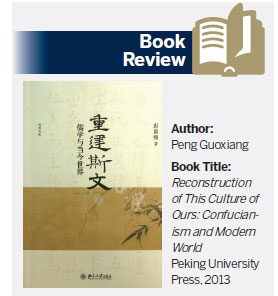Confucius, the contemporary
Updated: 2015-11-06 08:08
By Guo Shuhan(HK Edition)
|
|||||||||
The glorious phase of Confucianism was during the Han Dynasty (202 BC - AD 220), when it was established as a state doctrine. Confucian philosophy reached its nadir, when it was labeled as imperial, feudal and a hindrance to the modernization of China in the early 20th century.
In a 2013 book by Peng Guoxiang, a notable scholar in Confucian studies and a professor of philosophy at Peking University, outlines his thinking on Confucianism's relationship with modern China and the world as a whole.
Peng thinks that a nation dissociated from its ancient cultural and spiritual heritage can never attain greatness, even when it has achieved great material success.
In his new book, Reconstruction of This Culture of Ours: Confucianism and Modern World, he underscores the idea that a revival of cultural awareness, especially those based on Confucianism and its core values - benevolence, justice, courtesy, wisdom and faith - is the way to go. It's a way the world's second-largest economy could earn the respect of the rest.
"The book represents the contemporary scholars' deep thoughts on cultural reconstruction. It also demonstrates the courage and discernment intellectuals informed by Confucianism should hold," commented Sun Haiyan, scholar with Institute of Philosophy and Religion of Guangdong, Academy of Social Sciences.
Peng thinks that Confucianism has been back in favor since the turn of the millennium. An increased reading of the classics and other social events geared towards greater engagement with ancient Chinese culture are helping to gradually reverse people's impressions of Confucianism.
He thinks that dissemination of ancient Chinese wisdom, like the notions informing western Enlightenment, can help China share its spiritual core and the essence of its thought with the world. Chinese people, to some extent, have a natural connection with the "living tradition".
He recalls in the book that some postgraduate students from Tsinghua University once organized a reading group on Confucian classics and consulted him. The students, who majored in science and technology, told him they felt overwhelmed by these classic teachings, from which they absorbed inner spiritual force.
Peng, a board member of the International Confucian Association, agrees that Confucian philosophy can help people fulfill "ultimate self-transformation".
Confucian teachings have long been considered a counterpart of similar philosophical ideas or sayings in other religions. It's a point repeatedly underscored in the book. As early as 1988, the first Confucian-Christian dialogue conference was held at the Chinese University of Hong Kong, Peng stresses.
Mou Zongsan, a major name in Confucian scholarship, once said religion, regardless of its form, was the fundamental propulsion and nuclear spirit of a civilization.
Mou said it was impossible to get a full picture of western culture without talking about Christianity. Science and democracy alone did not make western civilization. Similarly, Confucianism must be taken into consideration when it comes to Chinese culture.
Peng reiterates in the book that Confucianism did play a part similar to that of other religions in the history of China and East Asia.
While stressing the importance of rejuvenation of Chinese culture, Peng also warns that certain narrow-minded nationalists and opportunists might hop on the bandwagon to serve their personal interests. He alerts if the dispersive negative force converges into a mighty current, which he terms the "kiss of death", it would work against the revival of Confucianism.
Papers published by Peng in the past decade feature in the book, which also includes his research on dissemination of the Confucian classics and his perspective on contemporary Confucian masters.

(HK Edition 11/06/2015 page11)